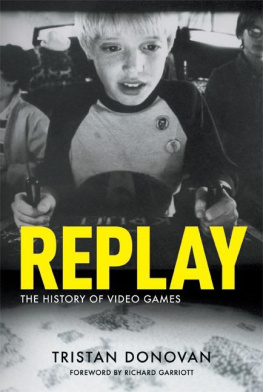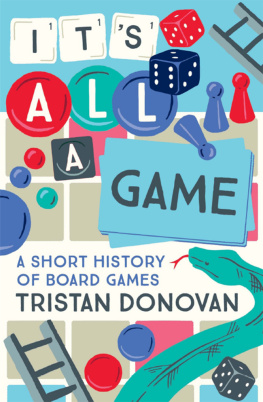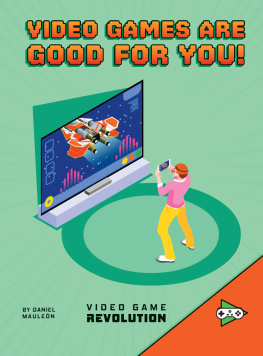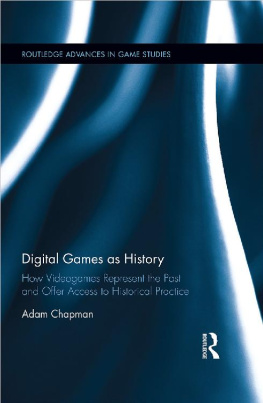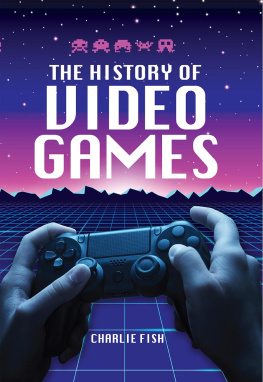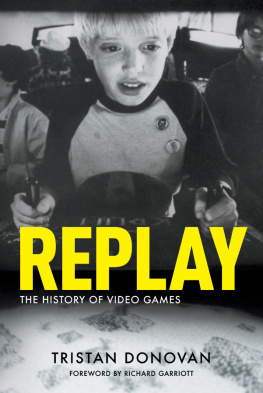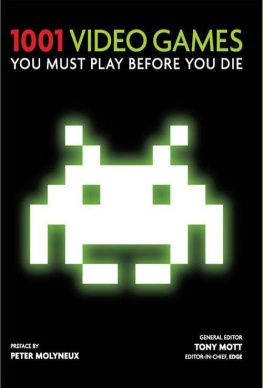Donovan - Replay: The History of Video Games
Here you can read online Donovan - Replay: The History of Video Games full text of the book (entire story) in english for free. Download pdf and epub, get meaning, cover and reviews about this ebook. year: 2010, publisher: Yellow Ant, genre: History. Description of the work, (preface) as well as reviews are available. Best literature library LitArk.com created for fans of good reading and offers a wide selection of genres:
Romance novel
Science fiction
Adventure
Detective
Science
History
Home and family
Prose
Art
Politics
Computer
Non-fiction
Religion
Business
Children
Humor
Choose a favorite category and find really read worthwhile books. Enjoy immersion in the world of imagination, feel the emotions of the characters or learn something new for yourself, make an fascinating discovery.
Replay: The History of Video Games: summary, description and annotation
We offer to read an annotation, description, summary or preface (depends on what the author of the book "Replay: The History of Video Games" wrote himself). If you haven't found the necessary information about the book — write in the comments, we will try to find it.
Replay: The History of Video Games — read online for free the complete book (whole text) full work
Below is the text of the book, divided by pages. System saving the place of the last page read, allows you to conveniently read the book "Replay: The History of Video Games" online for free, without having to search again every time where you left off. Put a bookmark, and you can go to the page where you finished reading at any time.
Font size:
Interval:
Bookmark:
About The Author
Tristan Donovan was born in Shepherds Bush, London, in 1975. His first experience of video games was Space Invaders and he liked it, which was just as well because that was one of only three games he had on his TI-99/4a computer that saw him through the 1980s.
He disliked English at school and studied ecology at university, so naturally became a journalist after graduating in 1998. Since 2001 he has worked for Haymarket Media in a number of roles, the latest of which is as deputy editor of Third Sector . Tristan has also written for The Guardian , Edge , Stuff , The Big Issue , Games TM , Game Developer , The Gadget Show and a whole bunch of trade magazines you probably havent heard of.
He lives in East Sussex, UK with his partner and two dachshunds.
REPLAY
The History of Video Games
TRISTAN DONOVAN

Published by Yellow Ant
Copyright Tristan Donovan 2010
Tristan Donovan has asserted his rights under the Copyright, Design and Patents Act 1988 to be identified as the author of this work.
All rights reserved.
Without limiting the rights under copyright reserved above, no part of this publication may be reproduced, stored in or introduced into a retrieval system, or transmitted, in any form or by any means (electronic, mechanical, photocopying, recording or otherwise) without the prior written permission of both the copyright owner and the above publisher of this book.
First published in Great Britain in 2010 by Yellow Ant. 65 Southover High Street, Lewes, East Sussex, BN7 1JA, United Kingdom
www.yellowantmedia.com
Cover by Jay Priest and Tom Homewood
Cover photo Corbis
iBook design by Yellow Ant
ISBN 978-0-9565072-2-8
To Jay, Mum, Dad and Jade

Richard Garriott, creator of the Ultima series
Foreword by Richard Garriott
Many consider the video games industry a young one. And, indeed, compared to many industries it is. It has developed from being a home-based hobby of the odd computer nerd to a multi-billion dollar business in just 30 years or so. I am old enough, and consider myself lucky enough, to have worked in the industry for much of its history. Astounding achievements in technology and design have driven this business to the forefront of the entertainment industry, surpassing books and movies long ago as not only the preferred medium for entertainment, but the most lucrative as well. Yet, it still has not been recognized as the important cultural art form that it is.
It is important to look back and remember how quickly we got here. Many who consider video game history focus on certain parts, such as consoles and other hardware that helped propel this business into the artistic medium it is today. However, there are many more aspects that are equally important. I believe that Tristan Donovans account is the most comprehensive thus far. In this book you will see his account of the inception of the video games true foundations. He details with great insight the people and events that led to what is the most powerful creative field today, and he takes a holistic view of the genre. Tristans unique approach demonstrates the strength of this field he focuses on how video games have become a medium for creativity unlike any other industry, and how those creators, artists, storytellers, and developers have impacted culture in not just the US, but worldwide. That is quite a powerful influence and warrants recognition.
This book credits the greatest artistic creators of our time but doesnt limit what theyve accomplished to a particular platform. The video game genre spans coin-operated machines, consoles, personal computers, and more recently, the impetus of mobile, web-based, and handheld markets. There are very few venues in life these days you will not see some sort of influence of a video game from music to film, to education to the military, games have touched the lives of people all over the world. While some cultures prefer a particular game style over another, the common denominator is that the art of the video game is not simply synonymous with entertainment, but with life.
Introduction
Why are you writing another book on the history of video games, asked Michael Katz, the former head of Sega of America, when I interviewed him for this book.
There are many reasons why, but two stand out. The first is that the attempts at writing the history of video games to date have been US rather than global histories. In Replay: The History of Video Games , I hope to redress the balance, giving the US its due without neglecting the important influence of games developed Japan, Europe and elsewhere. The second, and more important, reason is that video game history is usually told as a story of hardware not software: a tale of successive generations of game consoles and their manufacturers battle for market share. I wanted to write a history of video games as an art form rather than as a business product.
In addition, video games do not just exist on consoles. They appear on mobile phones, in arcades, within web browsers and, of course, on computers - formats that lack the distinct generational divides of consoles. Hardware is merely the vehicle for the creativity and vision of the video game developers who have spent the last 50 or so years moulding a new entertainment medium where, unlike almost all other rival media, the user is an active participant rather than a passive observer.
Hardware sets limits on what can be achieved, but it does not dictate what is created. The design of the ZX Spectrum home computer did not guarantee the creation of British surrealist games such as Jet Set Willy or Deus Ex Machina . The technology of the Nintendo 64 only made Super Mario 64 possible, it did not ensure that Shigeru Miyamoto would make it.
The real history of video games is a story of human creativity, aided by technological growth. Replay sets out to celebrate the vitality and vision of video game creators, and to shed light on why video games have evolved in the way they have. For that reason not all of the games featured in this book will have been popular and conversely some very popular games are not mentioned. The focus is on the innovative, not the commercially successful.
Finally, a note on terminology. Ive used the term video game throughout this book with the occasional use of game when there is no risk of confusion with other forms of game such as board games. I chose video game in preference to other terms for several reasons: it remains in every day use, unlike TV game or electronic game; it is broad enough to encompass the entire medium unlike computer game, which would exclude games, such as Ataris Pong , that did not use microprocessors; and terms such as interactive entertainment, while more accurate, have failed to catch on despite repeated attempts over the years.

Space race: Spacewar! co-creators Dan Edwards (left) and Peter Samson engage in intergalactic warfare on a PDP-1 circa 1962. Courtesy of the Computer History Museum
1. Hey! Lets Play Games!
The world changed forever on the morning of the 17th July 1945. At 5.29am the first atomic bomb exploded at the Alamogordo Bombing Range in the Jornada del Muerto desert, New Mexico. The blast swelled into an intimidating mushroom cloud that rose 7.5 kilometres into the sky and ripped out a 3 metre-deep crater lined with irradiated glass formed from melted sand. The explosion marked the consummation of the top-secret Manhattan Project that had tasked some of the Allies best scientists and engineers with building the ultimate weapon - a weapon that would end the Second World War.
Next pageFont size:
Interval:
Bookmark:
Similar books «Replay: The History of Video Games»
Look at similar books to Replay: The History of Video Games. We have selected literature similar in name and meaning in the hope of providing readers with more options to find new, interesting, not yet read works.
Discussion, reviews of the book Replay: The History of Video Games and just readers' own opinions. Leave your comments, write what you think about the work, its meaning or the main characters. Specify what exactly you liked and what you didn't like, and why you think so.

